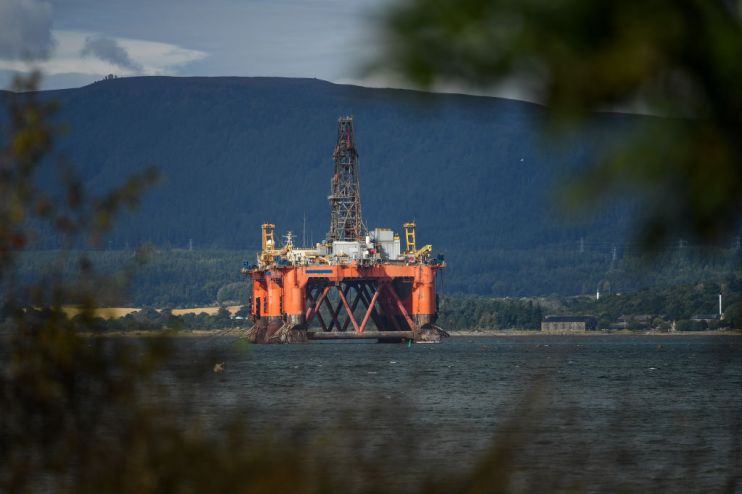BP boss confirms higher taxes in line with profits as Labour calls for investment relief to be scrapped

BP boss Bernard Looney has confirmed the energy company will be paying more taxes in line with near-record quarter results.
In an investor conference call, he said he recognised the pain people were facing with energy bills, and confirmed the energy giant’s commitment to boosting the UK’s energy infrastructure.
This would help power the UK’s drive for supply security and eventually ease energy bills.
BP has pledged £18bn of investment into the UK’s energy sector this decade – including offshore wind, hydrogen and battery power.
Earlier this year, it revealed it expects to pay at least £1.25bn in the UK this year, a number which is likely to rise following the introduction of the Energy Profits Levy.
This is a 25 per cent levy placed on the profits of North Sea oil and gas operators – which includes 91 per cent investment relief for domestic energy firms that commit to domestic energy projects.
Earlier today, BP unveiled monster profits of $8.5bn (£6.95bn) for the second quarter of this year, powered by soaring oil and gas prices following Russia’s invasion of Ukraine.
Labour slams energy giants’ profits
Its results follow in the footsteps of rivals Shell, Equinor, ExxonMobil and Chevron – which all posted historically high profits over the past week.
In response to BP’s hefty earnings, Labour’s Shadow Chancellor Rachel Reeves has called for the investment relief to be scrapped from the windfall tax.
She said: “People are worried sick about energy prices rising again in the autumn, but yet again we see eye-watering profits for oil and gas producers. Labour argued for months for a windfall tax on these companies to help bring bills down, but when the Tories finally u-turned they decided to hand billions of pounds back to producers in tax breaks. That is totally wrong. It’s clear people need greater protection from rising bills. That’s why Labour would use this money now to help people get through the winter.”
The Shadow Chancellor revealed Labour would bring down energy bills with a 10-year warm homes plan, which would cut bills for 19 million homeowners with insufficient insulation across the country.
However, industry body Offshore Energies UK (OEUK) argued continued investment in the North Sea was vital for ramping up supplies and taming bills.
It argued future projects were vital to ensuring the UK was insulated from future market shocks and geopolitical volatility – such as Russia’s invasion of Ukraine and subsequent supply shortages in Europe.
Will Webster, energy policy manager at OEUK, explained: “Our view is that if the UK wants to protect itself against similar future crises, then it must maintain those offshore resources – and that needs investment. The UK’s existing oil and gas fields are depleting so, if we don’t invest, our own supplies will dwindle further. Then we’ll be even more at the mercy of world markets. So the UK’s governments should be careful to promote investment in the UK.”
He also suggested that quarterly and annual results only give “a snapshot” of recent months, rather than longer-term trends.
Oil and gas prices have been volatile in recent years with oil and gas prices also experiencing periods with low returns and losses, such as during the pandemic when commodities dipped amid sunken demand.
The offshore industry is now paying the highest rate of tax in its history, and is predicted to contribute at least £12bn to the Treasury, plus a similar amount next year.
Craig Erlam, senior market analyst at OANDA said: “There will undoubtedly be an enormous amount of attention on these earnings, which come days after Shell’s record profits, coming at a time when households are facing eye-watering energy bills. But in much the same way that these firms make huge profits when prices are high, it works both ways. Not that this makes it any easier to accept when we’re experiencing such an extreme example as we are currently.”
Brits exposed to painful price hikes in energy bills this winter
Household energy bills are expected to close in on £4,000 per year this winter, with Cornwall Insight further forecasting that prices will remain historically elevated until 2024.
This will bring millions more people into fuel poverty and risks low-income households choosing between heating and eating.
Cornwall Insight has called for further support for households, as has Westminster’s BEIS Committee and energy bosses such as Good Energy chief executive Nigel Pocklington.
Harriet Lamb, chief executive climate charity Ashden, slammed BP’s profits as “unsound, unethical and economically disastrous.”
She called on the Government to ramp up support as soon as possible – beyond current pledges for £400 reductions in household bills.
She said: “A £400 discount won’t even touch the sides of people’s bank accounts. In less than 3 months, a typical energy bill will cost a third of the state pension. But where is the government’s plan? We need a rapid detox from fossil fuels.”